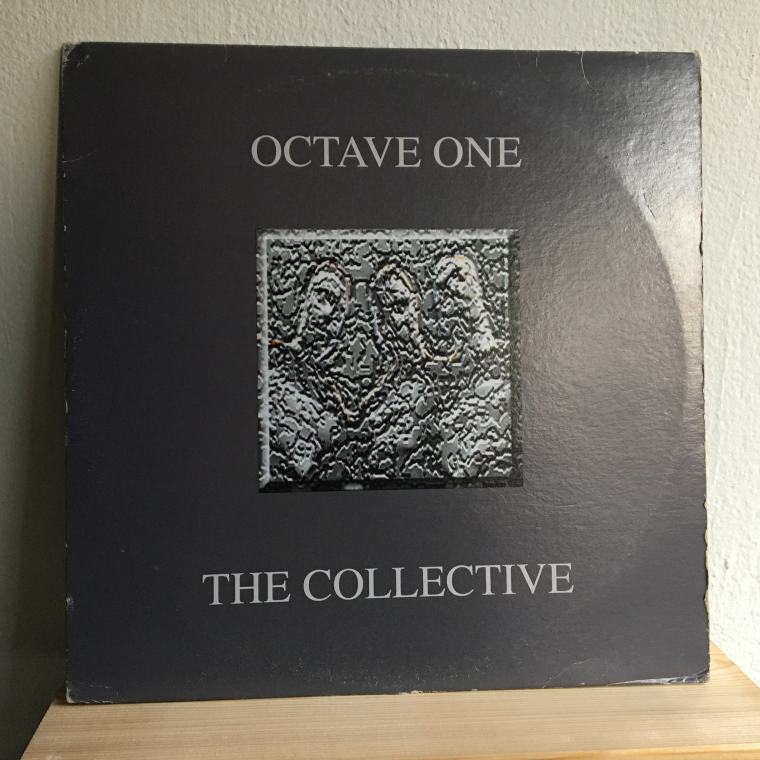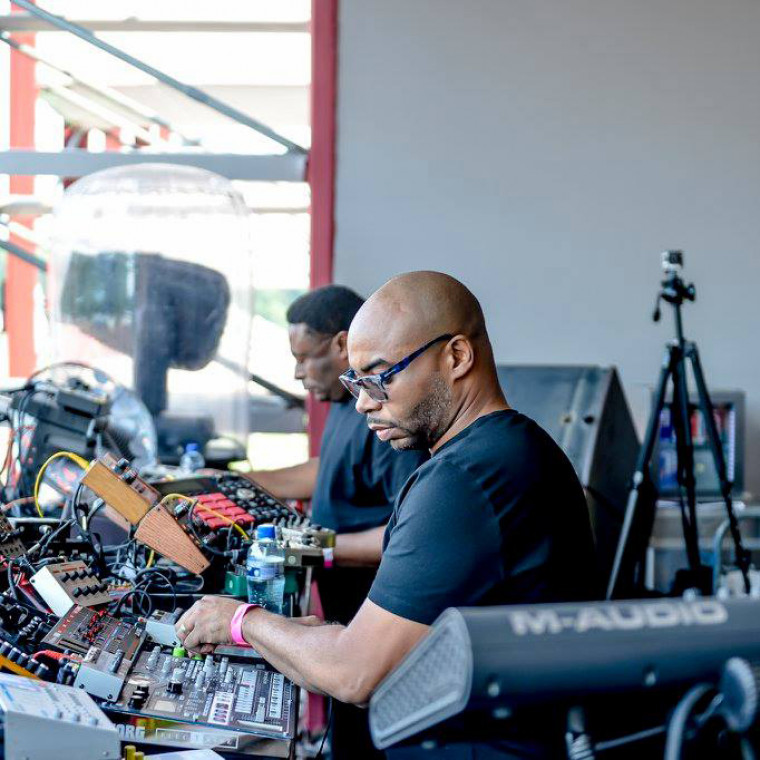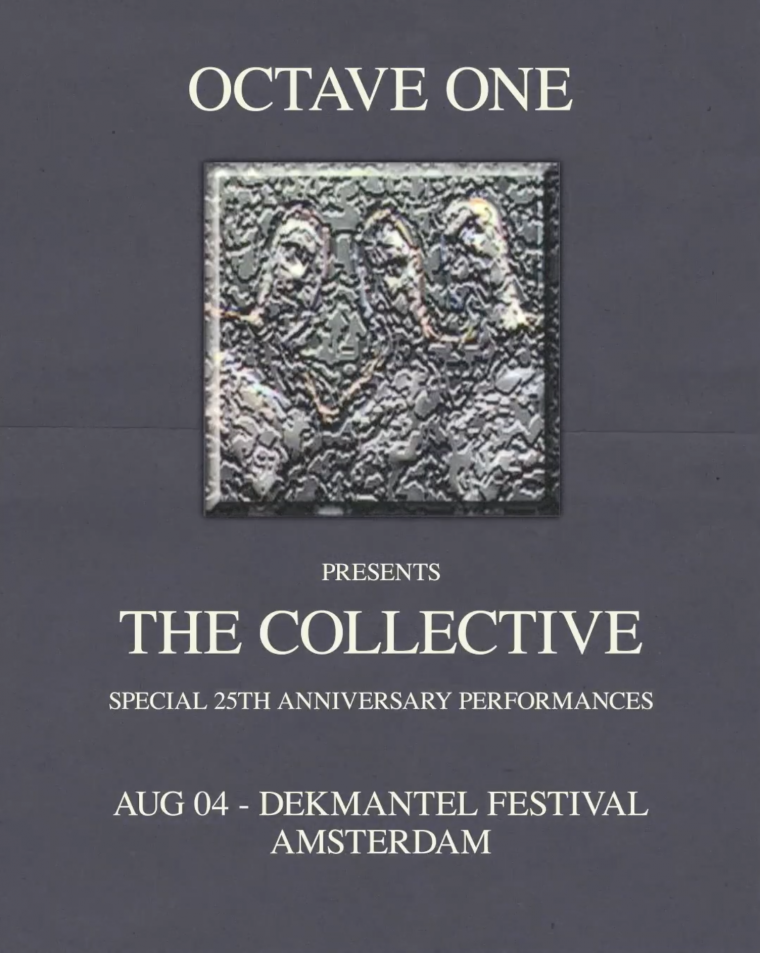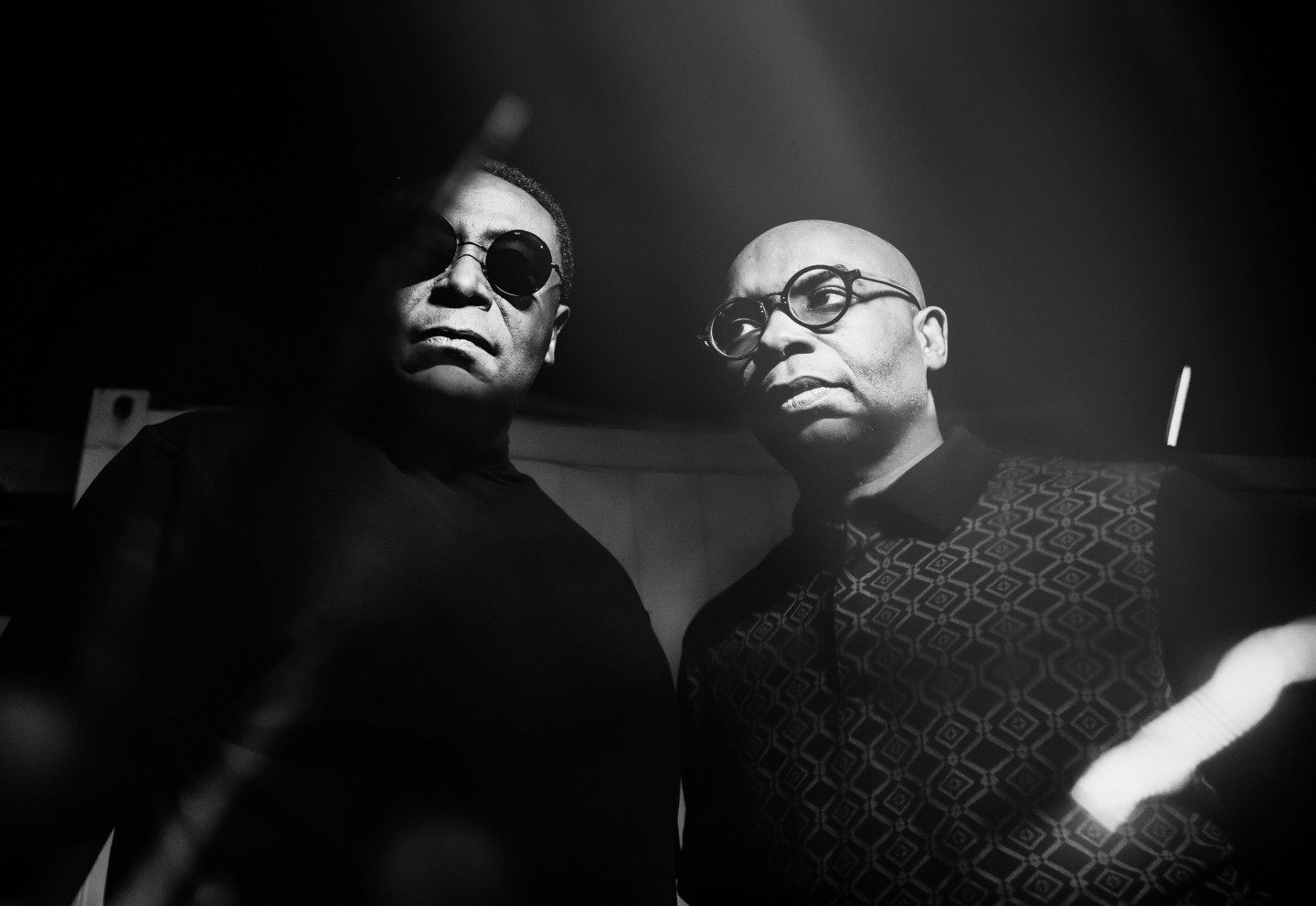Detroit techno is like speaking in tongues. To talk using sound that can’t be identified into real words. A wordless(ish) music that has so much to feel. Some call that feeling soul. Others see it as spiritual.
It’s most likely a bit of both. The founding two brothers of Octave One, Lenny and Lawrence Burden (three more brothers: Lynell, Lorne, and Lance would soon join), recognized how new consumer sound technology in the 80’s like drum machines and synthesizers could be programmed into having soul. Quickly, they were proven right with their first song “I Believe” in 1990 grabbing a placement on the compilation Techno 2: The Next Wave.
Words by Ryan C. Clarke
At the end of the millennium, the Burden brothers decided to look back and repackage their singles into one compilation, The Collective. More than a collection of singles, the name signals a way of being. The group’s name already echoes this sentiment (on one accord…). For a 16-track LP from 1998 with songs that we’re being worked on in 1988, The Collective has an edge that has held its sharpness for decades. Always considered producers that are either making ‘techno that's too house’ or ‘house that’s too techno’ might have been their saving grace. By making music that can’t be held down, they’ve allowed themselves to experiment without labels for generations.

Formed organically live at the club when a brother saw another in performance distress trying to handle the mixing boards, sequencers, synths, and drum machine, Octave One has evolved that faithful night of assistance into its own system. Since then, they’ve been known and heard worldwide from this improvisational set-up; Lenny strictly manning the sequences and production while Lawrence rides the 32-channel mixer. Each one reacting to the other’s choices without a word spoken.
For as much as Techno has a history, the culture seems to be a little allergic to looking back fondly to the past. It is future music after all. Bred from a desire to see beyond your empty city. Staring at the ceiling listening to Electrifying Mojo on the radio produce theater in your mind with just sounds and ideas. So why talk about back then? Everything worth hoping is what we haven’t heard yet, right? ‘The Collective’, a compilation that collects tracks that go as far back as 1990, is evidence alone to the contrary. There’s an african proverb known as Sankofa, meaning, “it is no wrong to go back for which you have forgotten.” Black music knows this approach as you continue to hear hints of the entire history of black music in the newest records. Remember, rhythm and blues is more than a genre. In looking back to know how to better move forward, the Burden brothers bring that ‘ancient to the future’ idea into practice. Lenny and Lawrence Burden decided to take a moment right before their retrospective live show at Dekmantel 2024 to sit down and share some stories, reflections, and clarifications with us. Maybe there are some thoughts we left behind that might be useful for today.

First, let me ask the obvious, how are you both looking back on the 25-year anniversary of ‘The Collective’?
Lenny: It's actually a little a little farther [back] than that! The Collective was a milestone. It was our 10th year [making records] this at that point. Now we perform; all we do is play live and our audience is younger and younger. A lot of them don't even realize that we're playing some tracks from before they were born. We play ‘Empower’ in our sets. Of course we play ‘Blackwater’. A lot of them from 2000, some earlier, from 1995.
For Dekmantel, we decided to do a set that's based on the first 15 years of our career, so anything before 2005 is fair game. This takes a lot of work because most of these [songs] are not multi-track songs. We have to recreate pieces. Certain things we can't recreate because of how we made the songs initially with the equipment not being available, we have to get close to it and we're very happy with how the productions are coming together.
Lawrence: We're looking back into our past and even realizing how we used to do things, things that we might have forgotten that we've done.
Something I thought was interesting to ask you both about are the liner notes that came with the compilation back in ’98. I can read it back to y'all:
“Electronic dance music is a theory yet to be proven for in as much as we may move to computer rhythms it is yet to be shown if our species will embrace the sound as more than just a fad of a generation. When we began our journey as producers of this future music in 1988 we had no idea to the complexities that could be expressed with the drum machine and the synthesizer, nor did we have an idea of the evolution that this music called ‘techno’ would encounter or the role that we would play. The selections contained herein are some of the signposts of our journey we hope that these programs move your body as well as your mind. This is our electronic dance music and with it we have visualized tomorrow beyond.”
How do you reflect on having these ideas back then and now seeing them in practice at the scale you perform?
Lenny: It's been an interesting journey and it's still evolving. It's not at that end of the evolution. Now, there’s something that we've never even thought about. You're coming into AI music and we didn't even think about computers making their music. Will there be a revolution where you people want to actually go back to something organic?
We've always thought the computer was not the end of it. It was the tool for us to be able to complete songs with limited resources. We heard a record and we had to try to figure out what they’re using and during that process we came up with our own way of doing things. We were trying to do things nobody was showing us.
We would hear a record and say, “how are they doing that drum roll?” We bought a 909 because we thought it was the drum machine that went backwards! We didn't realize it was a tape loop that people were cutting tape and flipping it.
Lawrence: [This sensibility] even fits our live show. Some of the things that we used to do that were really unorthodox in the studio back in the day, are some of the same things that we do on stage. No one taught us how to perform live so we have this mentality where we create in our own space. We're in our own lane.
People are always saying, “I can't believe you guys don't talk to each other during a show”. What we are doing is talking via our instruments, via the things that we do where we don't need to speak. If we're talking then there's a problem.
"No one taught us how to perform live so we have this mentality where we create in our own space. We're in our own lane."
About staying in your lane. What does that mean to you? Much of the narrative around the first and second waves of Detroit techno speak to how communal it was. People passing around a single drum machine across state lines. Seems like there was a circulation there. But when you hear the story of Octave One it feels more secluded. I think the only collaborator that y’all had in your first 10 years was Anthony “Shake” Shakir.
Lenny: We were all a part of sharing gear. When I moved into my first apartment, my next-door neighbour was Marty Bonds [Model 500] at the time. Eventually his roommate was Jay Denham. Marty’s brother ends up moving in; he's in this group called Strand. Carl Craig's sister also lived in the same building. This isn't the reason why we started making music, we just ended up all in the same area.
Lawrence: We found that we collaborated best with each other. We were all on the same journey, we could finish each other's musical sentences.
Looking back and looking ahead do you feel like you're still finding those moments in the studio or our stage where you’re surprising yourselves and audience?
Lenny: I think we're not really searching per se for those moments. They just kind of happen. A show we just did had some of the gear malfunctioning, but it also created a space for new ideas. It was a little challenging because we didn't feel the same way that we usually do towards the show but the crowd absolutely loved it. They went bananas.
Lawrence: Our whole show is pretty much improv. Everything is improvisational so we don't really know. I don't know what Lenny's approach might be on this particular song. Actually we don't have an order. Lenny's choosing the songs and I'm reacting to what he's choosing. [There’s] definitely that jazz quality to it where hopefully we're creating something unique every time.
Lawrence, how does musicality find itself in live mixing for you?
Lawrence: I come from dj culture. That's still my approach, but now instead of having two tracks or even three records, I got 32. [Live mixing] wasn't anything we rehearsed. [In the early 90’s] I was dj'ing and Lenny was trying to work all these pieces of gear. He was jamming but reaching over the mixing desk to come back to the synthesizer, so I jumped onstage with him and started playing the mixing desk. We started jamming out that way.
Back to ‘The Collective’. Are there any memories or stories that come to mind from the time you started making them?
Lawrence: I was mixing down ‘Empower’, a track Lenny was working on in his second apartment. It was a real big cement room with lot of [re]verb. When I came by to start mixing it down, Lenny was like, “whatever you do, do not touch the pods on the 909” because they were literally dirty and crunchy. We had to mix it down exactly like that really quickly and when we actually did touch it, it broke loose!
When people listen to ‘Empower’ [asking], “how did you guys do those time rhythms like that?” Me and Lenny always laughed.
Tell me a bit about the track titles. They almost read as small poetry. Are they hinting at what each song is painting an idea of?
Lenny: It's a soundtrack for a connected world. They all have their meanings, and we don't tell people what they are, but we're constantly building this world. Everything is interlocking.
What’s going on with the artwork?
Lenny: It was our interpretation of a monument. Our milestone record.
My last question is about Barry White. In so many of your interview he gets namechecked somehow. What does he mean Octave One?
Lawrence: I am a huge Barry White fan. When we first started doing techno, Shake said, “Man y'all made the kind of techno you can make love to!” That was because of the influences of someone like Barry White. We like strings, we like rhythms, and Barry could build all of that and encapsulate [them] into one particular production. That's our approach. It’s a grinding soulful force.
Lenny: We know our stuff is very baseline driven. Even down to Barry’s cadence over a record [for example] our first record ‘I Believe’, we're talking on top of a record… that could easily be Barry.

Octave One will perform a special life performance of 'The Collective' during Dekmantel Ten at the Amsterdamse Bos on Sunday the 4th of August. Final tickets available here.
